How tech can hinder – and help – your sleep
Our addiction to phones and other devices is seriously impacting on the quality of our sleep
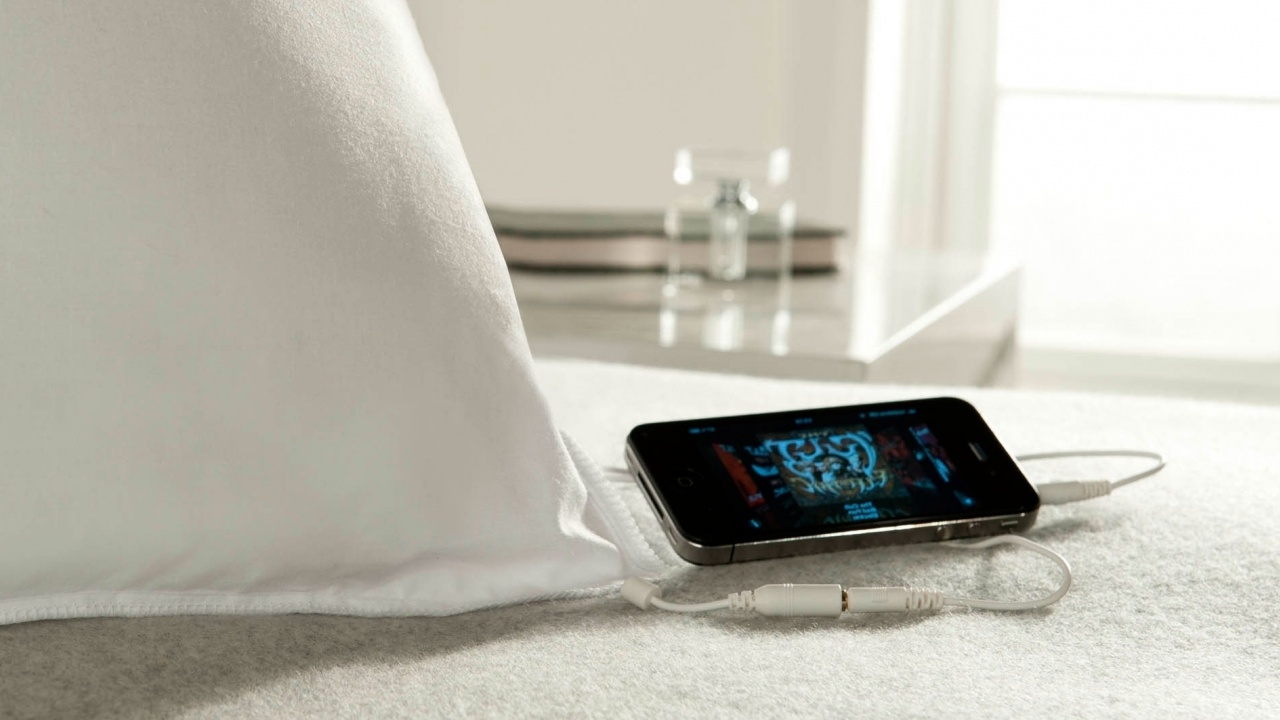
Sign up for breaking news, reviews, opinion, top tech deals, and more.
You are now subscribed
Your newsletter sign-up was successful
Our gadgets have become so integrated into our everyday lives that it's hard to remember a time before we had them – and now there's growing concern that we're spending too much time using them.
According to research from the UK's Nottingham Trent University, every day the average person uses their device 85 times and browses the internet for five hours.
And a report by UK telecoms regulator Ofcom found that adult internet users in the UK currently spend an average of one day per week online, with 59% of adults believing they're hooked on their devices.
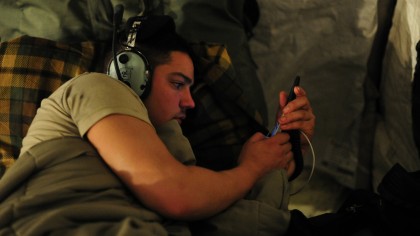
Many experts fear that such high levels of tech usage are harming our health – particularly the quality of our sleep. According to the University of Hertfordshire almost six in ten Britons are sleep deprived – an increase of 50% since 2013 – with gadget use near to bedtime thought to be a major contributing factor.
Another study, undertaken in Norway last year and involving 10,000 teens, found that the longer an individual used a device before bed, the less sleep they'd end up getting. There was also a 49% chance they would take an hour or more to drift off.
How tech is killing our sleep
Good quality sleep contributes to a long and healthy life. It's our body's chance to recuperate after a long day of work. However, technology can interfere by affecting our levels of melatonin, the hormone that helps us fall asleep and maintain healthy sleep cycles.
Saj Devshi, a psychology and sleep expert, explains that the blue light emitted by devices can impact the sleep process. And you don't even have to use a device before bed to experience the effects – just having tech in your bedroom can be as bad.
Sign up for breaking news, reviews, opinion, top tech deals, and more.
"Gadgets such as laptops and mobile phones, as well as even the standby light from our television sets, can all affect healthy sleep patterns without us even realising it," says Devshi. "This is because any form of light, even artificial light, disrupts our body from releasing melatonin, which is the body's natural sleep hormone."
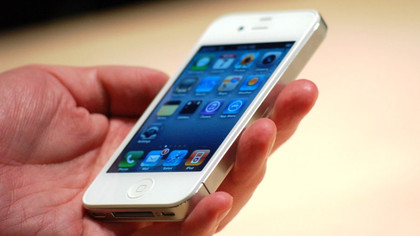
"A lot of people like to sleep with their mobile phone next to them without realising that this can cause broken sleep. Every time a notification comes in, our body can detect this emitted light and thinks it's time to wake up, so stops producing melatonin. This is why we sometimes feel quite physically and mentally tired the next morning."
Dr Michael Breus, who writes on the topic, says using tech during the night overstimulates the brain. "Reading exciting news articles or playing games keeps your mind very active, making it difficult for you to relax and be 'ready' to fall asleep," he says. "Using these devices brings the rest of your life into the bedroom, and as I've said before, the bedroom should be a sanctuary reserved for sleep."
A damaged mind
Dr Tara Swart, a neuroscientist and lecturer at MIT, says that as well as affecting the sleep process, using technology before going to bed can also result in IQ loss. She says: "As well as leaving us lethargic and demotivated, poor quality sleep, or not enough sleep, can affect our IQ level."
"At its most extreme, an entire night's disturbed sleep can account for 1 standard deviation loss on your IQ. This means that you will be effectively operating with a below-normal IQ. Any sleep disturbance leads to an apparent IQ loss of 5-8 points the next day."
All is not lost, though. Swart says 'detoxing' from tech can help you recover from sleep deprivation, and it's something that's growing in popularity. Recent findings released by the UK's Ofcom suggest that around 34% of people have taken a break from the internet.
"It is a good idea to try a period of 'digital detox' where you avoid using technology, even if it is just for a weekend," Swart adds. "The resulting increase in space and time to think is important for enhancing your creativity, as well as allowing you to spend more time with family and friends."
Rise of the digital detox
These detoxes are relatively simple – you just have to give up technology for a set period of time, which can be anything from a few hours to a few days a year. There are also books and even apps that will help you detox effectively.
Arianna Huffington's book, Thrive, is a popular example, introducing the process of 'switching off' from technology. German app OffTime, available on Android and iOS, will block calls, texts and other notifications while you take a break from your phone. The aptly named Digital Detox app is more extreme – it'll turn your phone off for 30 minutes, an hour, a day or more.
Laura-Emily Dunn, director of copywriting agency LED Media, is one of the growing number of people who have spent time away from their technology. Talking about her experience, she tells TechRadar: "I digitally detoxed for a week, and immediately noticed a change in my way of working and how I was feeling.
"I limited my use of technology to an hour and a half a day. The benefits came straight away. My sleep patterns improved. I felt healthier, with more energy, and those awful strained headaches disappeared."
Sleep apps galore
Detoxing isn't the only answer. There are a ton of apps out there designed to help you get a better night's sleep. Sleep Cycle, which is free on both Android and iOS, is a great example. This smart alarm clock analyses the way you sleep through by listening to the sounds you make, and wakes you up during your lightest sleep phase so you feel rested in the morning.
SleepGenius is another popular choice. Available for Android and iOS devices, it uses complex neurosensory algorithms and natural sounds to train your brain into sleeping faster, longer and deeper. The app works for all stages of sleep, before waking you up with a gentle alarm.
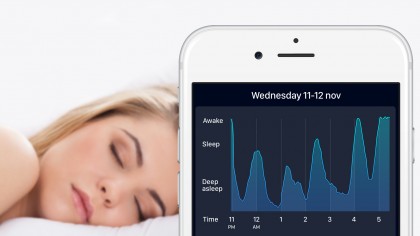
Yoga is a good way to relax your mind and get prepared for bed, and Smita Joshi, author of the Karma & Diamonds trilogy, recommends the app Universal Breathing: Pranayama.
She says: "Based on yogic breathing principles, it focuses your breathing and slows it down to take deeper and longer breaths. Diaphragmatic breathing, by filling the lungs with air, has many benefits: falling asleep faster, relief from stress, headaches and migraines."
Tech cures
While tech might be causing many of these problems, it's also sometimes the answer, with many gadgets on the market designed to help you sleep better.
Apple's Night Shift technology for iPhones and iPads reduces the amount of blue light emitted by the display as the day progresses, with your phone or tablet's screen taking on a warmer orange tint after sunset to reduce eye strain and help you fall asleep more easily. Other manufacturers are incorporating similar features in phones, tablets and ereaders.
The Lumie Bodyclock Active, meanwhile, offers a form of light therapy. Its sunset feature produces a gradually dimming light to help you drift off faster, and depending on which model you buy you can select different sunset lengths, from 15 to 90 minutes.
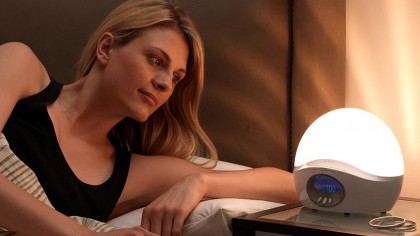
Technology can also identify problems that may be hindering your sleep. The recently-announced iFit Sleep HR is a contactless sensor that tracks heart rate and monitors light, deep and REM sleep. The aim is to help users improve their overall sleep quality.
Stuart Palmer, from iFit UK, says: "Sleep quality is as important as sleep quantity, and the deep stages of non-REM (rapid eye movement) sleep, known as slow wave or delta sleep, repair the body, generate tissue and build bone and muscle.
"Understanding and improving the quality of our sleep is key to improving our overall health and, conversely, improved fitness supports better sleep."
More options include the Sound Asleep Speaker Pillow, which will let you fall asleep listening to your favorite songs or a podcast, and the Bulletproof Sleep Mat, developed by former Silicon Valley entrepreneur Dave Asprey, which draws on acupressure principles to enable faster, deeper sleep in order to boost energy and lower stress.
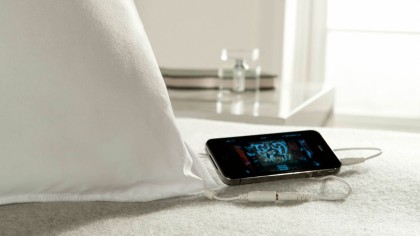
"I've hacked my sleep for years, and now function brilliantly on just under six hours – healthy people need less sleep," says Asprey. "It's an art and science, as you want to focus on sleep quality over quantity."
As you can see, technology can have dire consequences for your health and sleep, but it can also help in improving maters. That said, you may still want to consider a digital detox if you feel that technology is having an adverse affect on your sleep, and your wellbeing.
Nicholas Fearn is a freelance technology journalist and copywriter from the Welsh valleys. His work has appeared in publications such as the FT, the Independent, the Daily Telegraph, The Next Web, T3, Android Central, Computer Weekly, and many others. He also happens to be a diehard Mariah Carey fan!